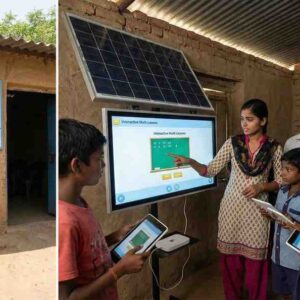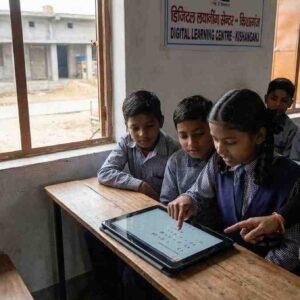A Look at the State’s Development Agenda and Its Ethical Implications
Lucknow– Uttar Pradesh, India’s largest state, is often seen as a barometer of the nation’s development. With ambitious infrastructure projects, industrial expansions, and policies aimed at economic growth, the state is making significant strides toward modernization. However, these advancements have raised questions about the ethical compromises being made in the name of progress.
As Uttar Pradesh races toward economic transformation, critics argue that environmental degradation, social inequities, and cultural displacement are being overlooked in favor of rapid development. Is the state prioritizing economic metrics over ethical values?
Key Metrics Highlighting Economic Growth in Uttar Pradesh
- GDP Growth: Uttar Pradesh’s Gross State Domestic Product (GSDP) grew by 8.1% in 2022-23, one of the fastest growth rates among Indian states (State Economic Survey, 2023).
- Industrial Expansion: Investments worth ₹33,000 crore were approved during the 2023 Global Investors Summit (UP Investors Summit Report, 2023).
- Infrastructure Development: Projects like the Purvanchal Expressway and Jewar International Airport are transforming connectivity and trade opportunities.
- Employment Generation: Initiatives like One District One Product (ODOP) have created over 25 lakh jobsin traditional and small industries (UP Government Report, 2023).
Balancing Growth and Ethical Considerations
1. Environmental Impact
- Development vs. Sustainability: Large-scale projects, such as highways and industrial parks, have led to deforestation and pollution. Kanpur and Lucknow consistently rank among the world’s most polluted cities, with PM2.5 levels exceeding WHO guidelines (IQAir Report, 2023).
- Government Initiatives: Programs like Namami Gange aim to rejuvenate the Ganga River but face criticism for focusing on urban stretches while neglecting rural waterways.
“We are losing our forests and rivers to concrete structures,”says Rajesh Tiwari, an environmental activist in Bundelkhand.“Development without sustainability is a ticking time bomb.”
2. Displacement of Communities
- Land Acquisition Controversies: Projects such as the Jewar International Airport have faced resistance from local farmers over inadequate compensation and loss of livelihoods.
- Cultural Erosion: Rapid urbanization in regions like Ayodhya and Varanasi is seen as sidelining traditional practices and heritage for commercial tourism.
“We welcome progress, but not at the cost of our homes and culture,”says Anita Yadav, a resident affected by urban redevelopment in Ayodhya.
3. Social Inequalities
- Urban-Rural Divide: While urban hubs like Noida and Lucknow benefit from development, rural areas, especially Bundelkhand, continue to struggle with poverty and lack of resources.
- Marginalized Communities: Critics argue that economic policies disproportionately benefit industrialists and urban elites, leaving marginalized groups behind.
“Development must be inclusive, or it risks widening the gap between rich and poor,”says Dr. Alok Gupta, a sociologist at Lucknow University.
Government’s Response to Ethical Concerns
- Sustainability Goals
- Programs like Mission Shakti Green Army promote afforestation and environmental awareness among youth.
- Compensation Policies
- The government has introduced revised compensation packages for land acquisition to address concerns of displaced communities.
- Inclusive Development Initiatives
- Schemes like ODOP aim to empower rural artisans and small businesses, ensuring a balance between economic growth and cultural preservation.
Critics Speak: Are Ethical Values Being Overlooked?
- Environmentalists: Highlight the loss of biodiversity and worsening air quality as critical issues.
- Social Activists: Argue that development is heavily skewed toward urban centers, neglecting rural needs and marginalized populations.
- Cultural Experts: Warn against the commercialization of heritage sites, which risks turning sacred spaces into tourist attractions devoid of authenticity.
“If development comes at the cost of ethics, it’s a hollow victory,”says Sunita Sharma, a historian based in Varanasi.
Pathways to Ethical Growth
1. Sustainable Infrastructure
- Prioritize green technologies in construction and urban planning to minimize environmental impact.
2. Inclusive Policies
- Expand rural development schemes to ensure equitable distribution of resources and opportunities.
3. Community Participation
- Involve local communities in decision-making processes for large-scale projects to address their concerns effectively.
4. Preservation of Heritage
- Develop tourism strategies that respect cultural integrity while promoting economic benefits.
Conclusion
Uttar Pradesh’s economic progress is undeniable, but it comes with ethical dilemmas that need urgent attention. The state must strive for a balanced approach that values sustainability, inclusivity, and cultural preservation alongside growth.
As Uttar Pradesh charts its path forward, the true measure of progress will not only be in GDP figures but in the state’s ability to harmonize development with ethical responsibilities.










